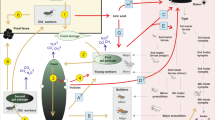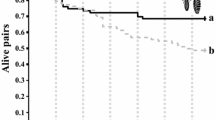Abstract
Success in aerial dispersal involves a trade-off between propagule size and dispersal ability, such that reducing weight may increase dispersal capability. Therefore, dispersing propagules such as plant seeds, fungal spores, and insect alates need to settle in new habitats with very limited resources. In termites, the time from alate dispersal to colony foundation is the most critical period in their life cycle, because a male and female pair establishes a new colony without help from others. In addition, termites depend largely on gut microbes for their nutrition. However, little is known about how termite founding pairs with limited resources establish new colonies and raise their first brood in association with their gut symbionts. Here, we provide an integrated analysis of the reproduction schedule, gut microbial fluctuations, and resource allocation of founding pairs in incipient colonies of the subterranean termite Reticulitermes speratus. There was a steep increase followed by a rapid decrease in the numbers of intestinal protozoa (hereafter, gut microbial pulse) at the time of larval hatching. Besides the monogamous pairs, same-sex (male-male and female-female) pairs also form tentative colonies in this species. Comparisons of changes in the amounts of protein and lipids in the different pair types revealed that the gut microbial pulse played an essential role in the parental feeding of the first-brood larvae. It was also observed that founders utilized stored protein and lipids for brood production. Our study highlights a significant role for intestinal symbionts during the early stage of the termite life cycle.
Significance statement
Propagules of most animals and plants encounter resource limitations after dispersal. This is especially true for termite alates; monogamous pairs found new colonies without help from workers. How do they manage the limited resources, including their nutritional reserves and gut microbes, during colony foundation? To gain a better understanding, we analyzed time-series data of reproduction schedules, gut microbial fluctuations, and resource allocation patterns in the founders of incipient termite colonies. We identified a “gut microbial pulse”, i.e., a steep increase followed by a rapid decrease in the number of intestinal protozoa, that occurred at the time of larval hatching. Our data imply that resources derived from the pulse play an essential role in parental provisioning to larvae. This study highlights a novel strategy of termites to overcome resource-limited situations and successfully establish a new colony.



Similar content being viewed by others
References
Afzal M, Salihah Z (1985) Sex ratio, occurrence of parthenogenesis, ovarian development and oviposition behaviour of the primary reproductives of Bifiditermes beesoni (Gardner) (Isoptera, Kalotermitidae). Zeitschrift für Angew Entomol 100:132–146. https://doi.org/10.1111/j.1439-0418.1985.tb02767.x
Barrett SCH, Kohn JR (1991) Genetic and evolutionary consequences of small population size in plants; implications for conservation. In: Holsinger KE (ed) Falk DA. Oxford University press, Genetics and conservation of rare plants, pp 3–30
Benjamino J, Graf J (2016) Characterization of the core and caste-specific microbiota in the termite, Reticulitermes flavipes. Front Microbiol 7:1–14. https://doi.org/10.3389/fmicb.2016.00171
Bonte D, Van Dyck H, Bullock JM et al (2012) Costs of dispersal. Biol Rev 87:290–312. https://doi.org/10.1111/j.1469-185X.2011.00201.x
Brossette L, Meunier J, Dupont S et al (2018) Unbalanced biparental care during colony foundation in two subterranean termites. Ecol Evol:1–9. https://doi.org/10.1002/ece3.4710
Chouvenc T (2019) The relative importance of queen and king initial weights in termite colony foundation success. Insect Soc 66:177–184. https://doi.org/10.1007/s00040-019-00690-3
Clobert J, Baguette M, Benton TG, Bullock JM (2012) Dispersal ecology and evolution. Oxford University press
Cole EL, Rosengaus RB (2019) Pathogenic dynamics during colony ontogeny reinforce potential drivers of termite eusociality: mate assistance and biparental care. Front Ecol Evol 7:1–14. https://doi.org/10.3389/fevo.2019.00473
Cook TJ, Gold RE (1998) Organization of the symbiotic flagellate community in three castes of the eastern subterranean termite, Reticulitermes flavipes (Isoptera: Rhinotermitidae). Sociobiology 31:25–39
Dean SR, Gold RE (2004) Sex ratios and development of the reproductive system in castes of Reticulitermes flavipes (Kollar) (Isoptera: Rhinotermitidae). Ann Entomol Soc Am 97:147–152. https://doi.org/10.1603/0013-8746(2004)097[0147:sradot]2.0.co;2
Dlugosch KM, Parker IM (2008a) Founding events in species invasions: genetic variation, adaptive evolution, and the role of multiple introductions. Mol Ecol 17:431–449. https://doi.org/10.1111/j.1365-294X.2007.03538.x
Dlugosch KM, Parker IM (2008b) Invading populations of an ornamental shrub show rapid life history evolution despite genetic bottlenecks. Ecol Lett 11:701–709. https://doi.org/10.1111/j.1461-0248.2008.01181.x
Fujita A, Shimizu I, Abe T (2001) Distribution of lysozyme and protease, and amino acid concentration in the guts of a wood-feeding termite, Reticulitermes speratus (Kolbe): possible digestion of symbiont bacteria transferred by trophallaxis. Physiol Entomol 26:116–123. https://doi.org/10.1046/j.1365-3032.2001.00224.x
Fujita A, Minamoto T, Shimizu I, Abe T (2002) Molecular cloning of lysozyme-encoding cDNAs expressed in the salivary gland of a wood-feeding termite, Reticulitermes speratus. Insect Biochem Mol Biol 32:1615–1624. https://doi.org/10.1016/S0965-1748(02)00100-5
Hare L (1934) Caste determination and differentiation with special reference to the genus Reticulitermes (Isoptera). J Morphol 56:267–293. https://doi.org/10.1002/jmor.1050560205
Hongoh Y, Sharma VK, Prakash T, Noda S, Taylor TD, Kudo T, Sakaki Y, Toyoda A, Hattori M, Ohkuma M (2008) Complete genome of the uncultured termite group 1 bacteria in a single host protist cell. Proc Natl Acad Sci 105:5555–5560. https://doi.org/10.1073/pnas.0801389105
Jahnes BC, Sabree ZL (2020) Nutritional symbiosis and ecology of host-gut microbe systems in the Blattodea. Curr Opin Insect Sci 39:1–7. https://doi.org/10.1016/j.cois.2020.01.001
Kitade O (1993) Symbiotic protistan faunae of Reticulitermes (Isoptera: Rhinotermitidae) in the Japan archipelago. Sociobiology 23:135–153
Kitade O (2007) Characteristics and host-symbiont relationships of termite gut flagellates. Japanese. J Protozool 40:101–112. https://doi.org/10.18980/jjprotozool.40.2_101
Kitade O, Hayashi Y, Takatsuto K (2012) Variation and diversity of symbiotic protist composition in the damp-wood termite Hodotermopsis sjoestedti. Japanese. J Protozool 45:29–36. https://doi.org/10.18980/jjprotozool.45.1-2_29
Kitade O, Hayashi Y, Noda S (2013) Symbiotic protist communities in the termite Coptotermes formosanus in Japan and a comparison of community structures between workers and soldiers. Japanese. J Protozool 46:21–29. https://doi.org/10.18980/JJPROTOZOOL.46.1-2_21
Koidzumi M (1921) Studies on the intestinal protozoa found in the termites of Japan. Parasitology 13:235–309. https://doi.org/10.1017/S0031182000012506
Kusaka A, Matsuura K (2018) Allee effect in termite colony formation: influence of alate density and flight timing on pairing success and survivorship. Insect Soc 65:17–24. https://doi.org/10.1007/s00040-017-0580-9
Lack D (1954) The natural regulation of animal numbers. Oxford University press, Oxford
Leishman MR, Wright IJ, Moles AT, Westoby M (2009) The evolutionary ecology of seed size. In: seeds: the ecology of regeneration in plant communities. pp 31–57
Levin SA, Muller-Landau HC, Nathan R, Chave J (2003) The ecology and evolution of seed dispersal. Annu Rev Ecol Evol Syst 34:575–604. https://doi.org/10.1146/annurev.ecolsys.34.011802.132428
Lewis JL, Forschler BT (2004) Protist communities from four castes and three species of Reticulitermes (Isoptera : Rhinotermitidae). Ann Entomol Soc Am 97:1242–1251. https://doi.org/10.1603/0013-8746(2004)097[1242:pcffca]2.0.co;2
Light SF, Weesner M (1955) The incipient colony of Tenuirostritermes tenuirostris (Desneux). Insect Soc 2:135–146. https://doi.org/10.1007/BF02224099
Matsuura K (2006) Early emergence of males in the termite Reticulitermes speratus (Isoptera: Rhinotermitidae): protandry as a side effect of sexual size dimorphism. Ann Entomol Soc Am 99:625–628. https://doi.org/10.1603/0013-8746(2006)99[625:eeomit]2.0.co;2
Matsuura K, Kobayashi N (2007) Size, hatching rate, and hatching period of sexually and asexually produced eggs in the facultatively parthenogenetic termite Reticulitermes speratus (Isoptera: Rhinotermitidae). Appl Entomol Zool 42:241–246. https://doi.org/10.1303/aez.2007.241
Matsuura K, Nishida T (2001) Comparison of colony foundation success between sexual pairs and female asexual units in the termite Reticulitermes speratus (Isoptera: Rhinotermitidae). Popul Ecol 43:119–124. https://doi.org/10.1007/PL00012022
Mauldin JK (1982) Lipid synthesis from [14C]-acetate by two subterranean termites, Reticulitermes flavipes and Coptotermes formosanus. Insect Biochem 12:193–199. https://doi.org/10.1016/0020-1790(82)90008-7
Michaud C, Hervé V, Dupont S, Dubreuil G, Bézier AM, Meunier J, Brune A, Dedeine F (2020) Efficient but occasionally imperfect vertical transmission of gut mutualistic protists in a wood-feeding termite. Mol Ecol 29:308–324. https://doi.org/10.1111/mec.15322
Miura T, Roisin Y, Matsumoto T (1998) Developmental pathways and polyethism of neuter castes in the processional nasute termite Hospitalitermes medioflavus (Isoptera: Termitidae). Zool Sci 15:843–848. https://doi.org/10.2108/zsj.15.843
Miura T, Hirono Y, Machida M, Kitade O, Matsumoto T (2000) Caste developmental system of the Japanese damp-wood termite Hodotermopsis japonica (Isoptera: Termopsidae). Ecol Res 15:83–92. https://doi.org/10.1046/j.1440-1703.2000.00320.x
Mizumoto N, Yashiro T, Matsuura K (2016) Male same-sex pairing as an adaptive strategy for future reproduction in termites. Anim Behav 119:179–187. https://doi.org/10.1016/j.anbehav.2016.07.007
Nalepa CA, Jones SC (1991) Evolution of monogamy in termites. Biol Rev 66:83–97. https://doi.org/10.1111/j.1469-185X.1991.tb01136.x
Nalepa CA, Bignell DE, Bandi C (2001) Detritivory, coprophagy, and the evolution of digestive mutualisms in Dictyoptera. Insect Soc 48:194–201. https://doi.org/10.1007/PL00001767
Noirot C, Noirot-Timothée C (1969) The digestive system. In: Krishna K, Weesner FM (eds) Biology of termites, vol I. Academic Press, New York, pp 49–88
Nutting WL (1969) Flight and colony foundation. In: Krishna K, Weesner F (eds) Biology of termites, vol I. Academic Press, New York, pp 233–282
R Core Team (2018) R: A language and environment for statistical computing. R Foundation for Statistical Computing, Vienna. https://www.R-project.org/
Roff DA (1992) The evolution of life histories: theory and analysis. Chapman & Hall, New York
Roisin Y (1992) Development of non-reproductive castes in the neotropical termite genera Cornitermes, Embiratermes and Rhynchotermes (Isoptera, Nasutitermitinae). Insect Soc 39:313–324. https://doi.org/10.1007/BF01323951
Roisin Y (1996) Castes in humivorous and litter-dwelling neotropical nasute termites (Isoptera, Termitidae). Insect Soc 43:375–389. https://doi.org/10.1007/BF01258410
Shellman-reeve J (1997) Advantages of biparental care in the wood-dwelling termite, Zootermopsis nevadensis. Anim Behav 54:163–170. https://doi.org/10.1006/anbe.1996.0412
Shimada K, Maekawa K (2010) Changes in endogenous cellulase gene expression levels and reproductive characteristics of primary and secondary reproductives with colony development of the termite Reticulitermes speratus (Isoptera: Rhinotermitidae). J Insect Physiol 56:1118–1124. https://doi.org/10.1016/j.jinsphys.2010.03.011
Shimada K, Lo N, Kitade O, Wakui A, Maekawa K (2013) Cellulolytic protist numbers rise and fall dramatically in termite queens and kings during colony foundation. Eukaryot Cell 12:545–550. https://doi.org/10.1128/EC.00286-12
Smith CC, Fretwell SD (1974) The optimal balance between size and number of offspring. Am Nat 108:499–506. https://doi.org/10.1086/282929
Swift MJ, Heal OW, Anderson JM (1979) Decomposition in terrestrial ecosystems. University of California press, Berkeley
Thorne BL (1983) Alate production and sex ratio in colonies of the Neotropical termite Nasutitermes corniger (Isoptera; Termitidae). Oecologia 58:103–109. https://doi.org/10.1007/BF00384548
Watson JAL (1972) Ovarian activity during development of incipient colonies of the termite, Hodotermes mossambicus. J Insect Physiol 18:603–607. https://doi.org/10.1016/0022-1910(72)90090-X
Wisely SM, Buskirk SW, Fleming MA et al (2002) Genetic diversity and fitness in black-footed ferrets before and during a bottleneck. J Hered 93:231–237. https://doi.org/10.1093/jhered/93.4.231
Yamaoka I, Sasabe K, Terada K (1986) A timely infection of intestinal protozoa in developing hindgut of the termite (Reticulitermes speratus). Zool Sci 3:175–180
Acknowledgments
We thank S. Dobata, K Kobayashi, N Mizumoto, T. Nozaki, W. Suehiro, and R Tanaka for helpful discussion and research assistance. We also thank S. Dobata for useful advice on statistical analysis and checking manuscripts.
Funding
This study was supported by the Japanese Society for the Promotion of Science Kiban Kenkyu S Grant 18H05268 for KM, and a Research Fellowship for Young Scientists from the Japan Society for the Promotion of Science (JSPS) no. 18J13513 for TI.
Author information
Authors and Affiliations
Contributions
All authors contributed to the study conception and design. Material preparation, data collection, and analysis were performed by TI, SY, TF, and KM. The first draft of the manuscript was written by TI and all authors commented on previous versions of the manuscript. All authors read and approved the final manuscript.
Corresponding author
Ethics declarations
Conflict of interest
The authors declare that they have no conflict of interest.
Additional information
Communicated by J. C Choe
Publisher’s note
Springer Nature remains neutral with regard to jurisdictional claims in published maps and institutional affiliations.
Rights and permissions
About this article
Cite this article
Inagaki, T., Yanagihara, S., Fuchikawa, T. et al. Gut microbial pulse provides nutrition for parental provisioning in incipient termite colonies. Behav Ecol Sociobiol 74, 64 (2020). https://doi.org/10.1007/s00265-020-02843-y
Received:
Revised:
Accepted:
Published:
DOI: https://doi.org/10.1007/s00265-020-02843-y




